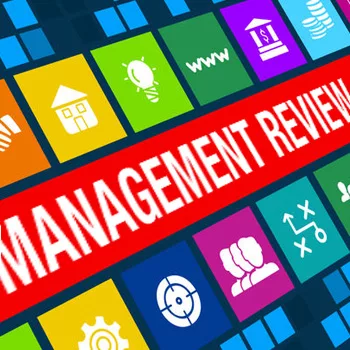Food Safety Management System: Management Review

In developing and implementing a food safety management system (FSMS), most standards repeatedly refer to top management as having numerous responsibilities to assure the program’s success. One area the standard may highlight for top management attention is called management review.
Assuring Ongoing Effectiveness
The management review requirement states that top management shall review the organization’s FSMS on an established frequency. The review assures the ongoing suitability, adequacy and effectiveness of the FSMS. This review also assesses opportunities for improvement and the need to change or update the FSMS to help the organization meet all food safety requirements and goals.
Review Process
The management review process requires that necessary information is collected so management can carry out this evaluation appropriately. The review must be documented in terms of what topics are discussed, what decisions are made and who within the organization is responsible for completing assigned tasks.
Management reviews must address possible changes to the food safety policy, status of goals and objectives for the year, and any other element within the FSMS to assure continuous improvement and compliance.
Topics covered in a management review typically include the following:
• Review of inputs such as:
• Internal audits results
• Third-party and regulatory audits findings
• Status of corrective actions and preventive actions
• Training requirements
• Follow-up from previous Management Review implementation requirements
• New or updated food safety rules or regulations and their impact on the organization
• Changing food safety circumstances that may affect the organization (positive & negative)
• Discussion on outputs such as:
• Management recommendations for improvement
• Review of any notices of violations
• Any other issues that impact the compliance and incident prevention aspect of the program
• Additional needs of resources
Continuous Improvement
By having top management review of the FSMS on a regular basis, the entire management system will constantly be improving and demonstrating management commitment:
• By reviewing suitability, the organization assures that it is meeting all standard requirements.
• By reviewing adequacy, the organization assures that it is meeting all internal business requirements.
• By reviewing effectiveness, the organization assures that employees with “boots on the ground” understand and follow all food safety requirements as documented in organizational procedures, work instructions and checklists.
This is key to improve the food safety and employee stewardship for an organization. An organization can have the best of intentions, but without an objective look at itself on a regular basis, it will not find out its deficiencies until after an incident. The management review provides the means of participation and involvement to ensure the preventive purpose of the program, because once an incident occurs, it is too late.
Roberto Bellavia is a senior consultant with nearly 20 years of experience working in the food industry as a quality assurance professional. He is currently a project manager for Kestrel’s food safety-related projects.
Looking for quick answers on food safety topics?
Try Ask FSM, our new smart AI search tool.
Ask FSM →





.webp?t=1721343192)
